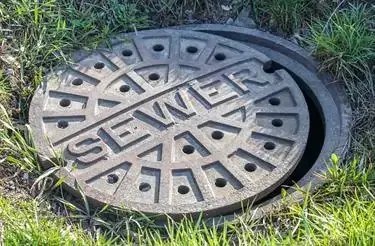Who is responsible for blocked wastewater drains
If your wastewater drain is blocked, and you're uncertain about who should handle the unblocking, don't worry. While some drainage problems clearly indicate responsibility, wastewater drains can be a bit more challenging to assign ownership to. Wastewater pipes from bathrooms, kitchens, and toilets connected to the council's system to transport wastewater also known as sewage from residential, commercial, and industrial areas for treatment. When a blockage happens a range of problems can occur including backups, foul odors, and environmental pollution, which means you will need a prompt resolution to prevent further issues.

Problems caused by blocked waste water drains
Blocked wastewater drains can lead to a variety of problems that can range from minor inconveniences to significant health and environmental hazards. To avoid these problems, regular maintenance and prompt attention to blocked drains are essential. You can also be mindful of preventative measures, such as avoiding flushing non-biodegradable items down toilets and using drain screens to catch debris, which can also help reduce the risk of blockages. If a blockage does occur, it's advisable to seek professional plumbing assistance to resolve the issue effectively and prevent further damage or health hazards.
- Slow Drainage: One of the initial signs of a blocked drain is slow drainage from sinks, bathtubs, showers, and toilets. Water may take longer to drain away, causing inconvenience and making daily tasks more time-consuming.
- Foul Odors: As wastewater accumulates and becomes stagnant due to a blockage, it can emit foul odors that permeate the affected area. These odors are often unpleasant and can make living or working conditions uncomfortable.
- Backups and Overflow: Blockages can cause sewage or wastewater to back up into sinks, bathtubs, or toilets within a building. This can result in unsanitary conditions and potential damage to property.
- Property Damage: Excess water from blocked drains can lead to water damage to walls, floors, and ceilings. In severe cases, it can weaken the structural integrity of a building, leading to costly repairs.
- Health Hazards: Blocked drains can create a breeding ground for harmful bacteria, mold, and other pathogens. These can pose health risks to occupants of the affected building, potentially causing respiratory issues and infections.
- Pest Infestations: Stagnant water and organic material in blocked drains can attract pests like cockroaches and rodents. This can lead to pest infestations within the property.
- Environmental Pollution: If blockages occur in public sewer systems, wastewater may overflow into nearby water bodies, causing environmental pollution. This can harm aquatic ecosystems, contaminate drinking water sources, and damage the environment.
- Costly Repairs: Clearing blocked drains often require professional plumbing services, which can be costly. In addition to the cost of repairs, property owners may also need to address any damage caused by water or sewage backups.
- Inconvenience: Blocked drains can disrupt daily routines and activities, such as bathing, cooking, and using the restroom. This inconvenience can be particularly problematic in commercial settings, where it can affect business operations.
- Legal and Regulatory Issues: Property owners and businesses may face legal and regulatory consequences if they do not address blocked drains promptly. Failure to maintain drainage systems in compliance with local regulations can lead to fines and penalties.
Responsible Parties for Blocked Wastewater Drains
The responsibility for dealing with blocked wastewater drains can vary depending on the location, the type of drainage system, and legal agreements. Homeowners, property owners, local municipalities, property managers, landlords, plumbing professionals, tenants, and homeowners' associations all have potential roles in addressing and preventing blocked drains. It is essential for all parties to be aware of their responsibilities and work together to ensure the proper functioning of wastewater drainage systems to protect both private and public infrastructure.
The below information outlines the key parties responsible for addressing blocked wastewater drains
Homeowners and Property Owners:
- Homeowners and property owners are typically responsible for the drains within their private properties. This includes drains in sinks, toilets, showers, and floor drains.
- It is their responsibility to prevent blockages by disposing of waste properly, avoiding flushing non-biodegradable items, and ensuring regular maintenance.
Local Council and Authorities:
- Municipalities or local authorities are responsible for maintaining public sewer systems and drainage infrastructure.
- If a blockage occurs in the public sewer system or the main sewage line leading from your property, it is usually the responsibility of the local municipality or sewage authority to address the issue.
Property Managers and Landlords:
- In cases of rented properties, property managers or landlords may take on the responsibility for addressing blocked drains, especially if the issue is due to the property's plumbing system.
Plumbing Professionals:
- When homeowners or property owners encounter a blocked drain that cannot be resolved through simple measures, they may need to hire a licensed plumbing professional.
- Plumbers have the expertise and equipment to diagnose and clear blockages in both private and public drainage systems.
Tenants and Renters:
- While tenants are generally not responsible for the maintenance of the property's drainage infrastructure, they play a crucial role in preventing blockages by using plumbing fixtures responsibly and reporting any issues promptly to property management or landlords.
Homeowners' Associations (HOAs):
- In residential communities governed by homeowners' associations, the responsibility for maintaining and clearing blocked drains may fall on the HOA, depending on the terms outlined in the community's bylaws and agreements.
Environmental Agencies:
- In cases where blocked drains lead to pollution or contamination of natural water bodies, local environmental agencies may become involved in addressing the issue to protect the environment.

Your local Blocked Drain Solution Specialist
If you are looking for expert advice and practical drainage solutions for your home or business contact Everyday Plumbing & Gas Services on 0488 801 008 or complete our quick online drainage service request form today.